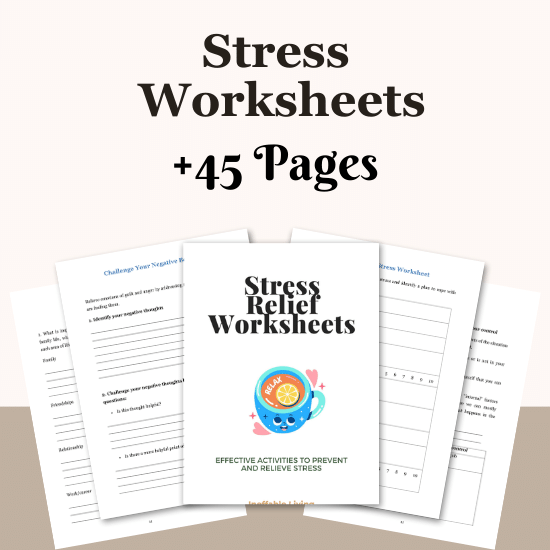Children experience stress just like adults, though they may not always have the words to express it.
Recognizing signs of stress and providing effective coping strategies can help them navigate challenging emotions and build resilience.
Here are some ways to identify stress in children and support them in coping.
How to Recognize Stress in Children?
Children often show signs of stress through behavior, physical symptoms, and emotional responses. Here are some key signs to look out for:
1. Changes in Behavior
- Increased irritability, anger, or mood swings
- Withdrawal from family or friends
- Sudden clinginess or seeking constant reassurance
- Avoidance of usual activities or interests
2. Physical Symptoms
- Headaches or stomachaches without a medical cause
- Changes in eating habits (loss of appetite or overeating)
- Trouble sleeping or nightmares
- Fatigue or decreased energy
3. Emotional Indicators
- Anxiety or fearfulness, especially about school or social interactions
- Low self-confidence or increased self-criticism
- Trouble focusing or a decline in school performance
4. Repetitive or Nervous Habits
- Nail biting, hair twirling, or thumb-sucking
- Fidgeting or restlessness
- Changes in communication, such as difficulty expressing thoughts or feelings
Related: How to Cope with Depleted Mother Syndrome?
How to Help Children Cope with Stress?
Once you’ve identified signs of stress, you can help your child cope by creating a supportive environment and teaching them healthy coping strategies.
1. Encourage Open Communication
Creating a safe space for children to express their feelings is essential for helping them cope. When children feel heard and understood, they’re more likely to open up about what’s bothering them.
How to Practice: Ask open-ended questions, like “What’s been on your mind lately?” or “Is there anything that’s making you feel worried?” Listen without judgment, acknowledging their emotions and letting them know it’s okay to feel that way.
2. Model Healthy Stress Management
Children learn by observing the adults around them. By demonstrating healthy ways to manage stress, you can help them develop their own coping skills.
How to Practice: Practice relaxation techniques like deep breathing or mindfulness, and let your child see how you handle stress in positive ways. You could say, “When I feel stressed, I take a few deep breaths. Want to try it with me?”
Related: I Hate Being A Mom! Is It Normal?
3. Encourage Physical Activity
Physical activity helps children release tension and boosts mood. Regular movement can be an effective way to reduce stress and improve overall well-being.
How to Practice: Engage in activities that your child enjoys, such as biking, dancing, or playing outside. Try to make physical activity a fun and consistent part of their daily routine.
4. Create a Predictable Routine
Having a consistent daily routine provides children with a sense of security and control, which can help reduce stress. Routines help children know what to expect, making the day feel more manageable.
How to Practice: Establish a routine that includes time for homework, play, meals, and bedtime. Let your child participate in creating the routine to help them feel more in control and involved.
Related: Best 7 Reactive Attachment Disorder Books
5. Limit Exposure to Stressful Situations
Stress in the environment, like exposure to negative news or adult conversations about financial worries, can affect children. Limiting their exposure to these stressors helps them feel safer and less anxious.
How to Practice: Shield your child from adult concerns or discussions that may cause them anxiety. If they overhear something distressing, take time to explain it in age-appropriate terms and reassure them of their safety.
6. Teach Relaxation Techniques
Simple relaxation techniques, like deep breathing or visualization, can help children manage their emotions and reduce stress.
How to Practice: Teach your child to take slow, deep breaths by pretending to smell a flower (inhale) and blow out a candle (exhale). You can also guide them in visualizing a peaceful place, like the beach or a favorite park, to help them feel calm.
7. Encourage Creative Outlets
Creative activities like drawing, writing, or playing music allow children to express their emotions in a non-verbal way, which can be especially helpful if they struggle to articulate their feelings.
How to Practice: Provide materials like crayons, markers, or a journal for your child to draw or write about how they’re feeling. Let them express themselves freely, and praise their creativity to reinforce this positive outlet.
8. Help Them Identify and Label Emotions
Children often experience stress because they don’t understand or can’t name their emotions. Teaching them to identify their feelings can help them process and manage them more effectively.
How to Practice: Use a feelings chart with different expressions, or ask them to describe their feelings in colors, like “feeling blue” for sadness. Validate their emotions and explain that all feelings are normal and okay to have.
Related: Top 10 Self Care Activities For Teens
9. Practice Problem-Solving Together
If a specific situation is causing stress, helping your child break down the problem and find solutions can empower them to manage their stress effectively.
How to Practice: Guide them through the problem-solving process. For example, if they’re stressed about a test, help them set up a study plan and practice positive affirmations. This teaches them that challenges can be overcome with support and planning.
10. Reassure Them with Positive Affirmations
Children need to feel safe and confident to manage stress. Positive affirmations and gentle reminders help reassure them and build resilience.
How to Practice: Encourage them to repeat simple affirmations like “I am strong” or “I can handle this.” You could also give them a “bravery token,” like a small stone or bracelet, to remind them they can overcome challenges.
When to Seek Professional Help
If your child’s stress symptoms are persistent, severe, or affecting their daily life, it may be beneficial to seek help from a mental health professional. Signs that additional support may be needed include:
- Constant worry or anxiety that doesn’t improve
- Persistent sleep issues or nightmares
- A noticeable decline in academic performance or social engagement
- Withdrawal or aggression that interferes with daily activities
Counseling can provide specialized support and teach children coping skills that will benefit them throughout their lives.

Conclusion
Helping children manage stress involves creating a safe, supportive environment and teaching them coping strategies.
By modeling healthy behavior, establishing routines, and encouraging open communication, you can empower them to face challenges with resilience and confidence.



